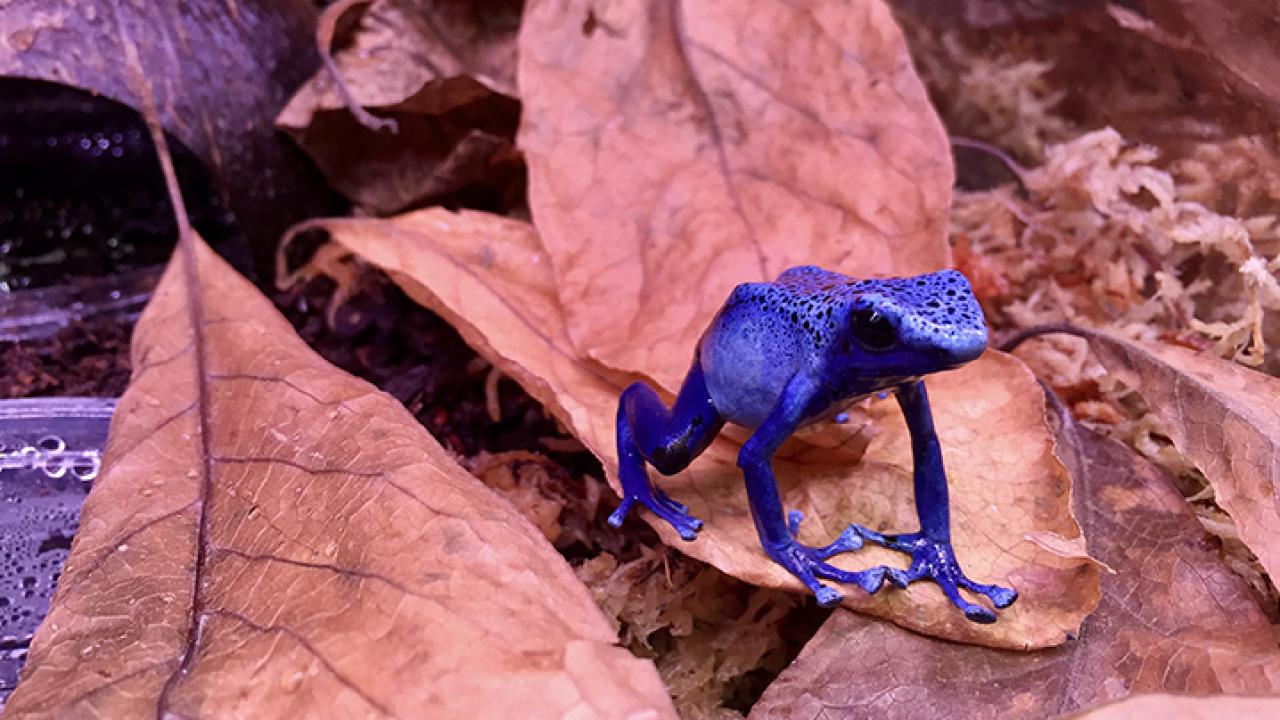
Poison Dart Frogs to Be Featured at Bohart Museum of Entomology Open House
UC Davis Assistant Professor Eva Fischer to Share Her Expertise

Live poison dart frogs will be featured at the Bohart Museum of Entomology open house, themed “Venomous vs. Poisonous,” on Sunday, March 2.
The event, free and family friendly, will take place from 1 to 4 p.m. in Room 1124 of the Academic Surge Building, 455 Crocker Lane, and in the hallway.
Neurobiologist and behaviorist Eva Fischer, who joined the UC Davis faculty in 2024 as an assistant professor of Neurobiology, Physiology and Behavior, “will be at the Bohart Museum open house with her poison dart frogs," announced Tabatha Yang, the Bohart Museum’s education and outreach coordinator. The frogs derive their poisons from a diet of insects, which include ants, mites and termites.
"In addition to being brightly colored and toxic, these frogs are amazing parents, which is what we mostly study about them," Fischer said. "They are also non-toxic in the lab because they get their toxins from their diet."
Poison dart frogs belong to the family Dendrobatidae which are native to tropical Central and South America. They are known for their bright coloration and toxicity.
Fischer, who has researched frogs for 10 years, grew up in Colorado. "I moved around the country and the world before settling in Davis last summer...I'm a neurobiologist and behaviorist by training and came to them because of their many cool behaviors rather than having been a frog lover from a young age. That said, I've certainly fallen in love with them now. I've gotten to see some of the species in the wild in Central and South America, which was amazing."
Fischer holds a bachelor’s of arts degree in biology and French (2007) from the College of Arts and Sciences, Cornell University, and a doctorate in zoology (2015) from Colorado State University. She was a National Science Postdoctoral Fellow (2015-2017) at the Center for Systems Biology, Harvard, and a postdoctoral fellow (2017-2020) in the Department of Biology, Stanford University.
Yang said the open house will focus on "the difference between venomous animals and poisonous animals that are arthropods. Monarchs will be featured as they are famously poisonous, but we are excited to share lesser-known animals like Asilid flies or assassin/robber flies, which have venom glands to subdue their insect prey.”
“For fun," Yang said, "we encourage people to come dressed in their favorite aposematic or warning colors--think yellows, reds and oranges contrasted with blacks or dark browns like black widows, yellowjacket wasps, or monarch butterflies.”
A family arts and crafts activity is also planned. Parking is free.
The Bohart Museum, founded in 1946, houses a global collection of eight million insect specimens, plus a live petting zoo comprised of Madagascar hissing cockroaches, stick insects, tarantulas and more. The Bohart gift shop is stocked with T-shirts, hoodies, books, posters, toy stuffed animals, jewelry and insect collecting equipment.
Director of the Bohart Museum is Professor Jason Bond, the Evert and Marion Schlinger Endowed Chair in the Department of Entomology and Nematology, and associate dean, UC Davis College of Agricultural and Environmental Sciences. He is president-elect of the American Arachnological Society.
For more information, contact the Bohart Museum at https://bohart.ucdavis.edu or bmuseum@ucdavis.edu.
